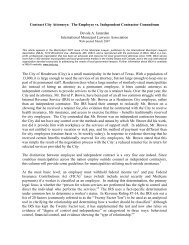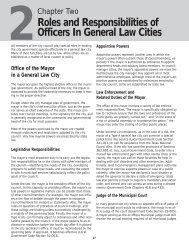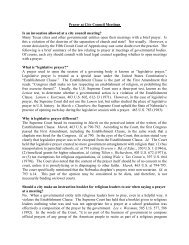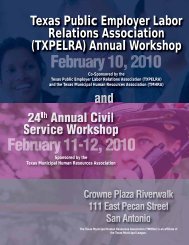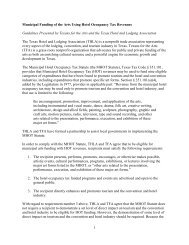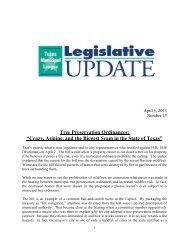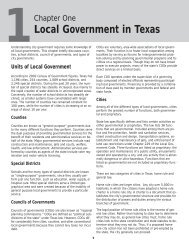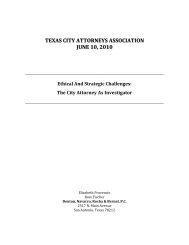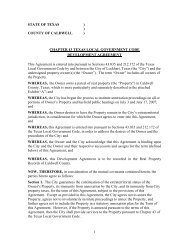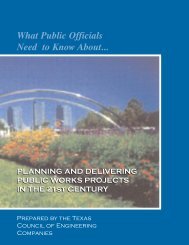Economic Development Basics - Texas Municipal League
Economic Development Basics - Texas Municipal League
Economic Development Basics - Texas Municipal League
You also want an ePaper? Increase the reach of your titles
YUMPU automatically turns print PDFs into web optimized ePapers that Google loves.
BASICS REGARDING STATUTORY ECONOMIC DEVELOPMENTTOOLSFOR MUNICIPAL ATTORNEYSFebruary 27, 2004A. <strong>Economic</strong> <strong>Development</strong> GoalsI.GENERAL BACKGROUND FOR CONSIDERINGECONOMIC DEVELOPMENT INCENTIVESArticle III Section 52-a of the <strong>Texas</strong> Constitution, adopted November 3, 1987, is titled,"Assistance to encourage state economic development," and declares that the followingtypical economic development goals are public purposes: development and diversification ofthe economy, the elimination of unemployment or underemployment, the stimulation ofagricultural innovation, the fostering of the growth of enterprises based on agriculture, or thedevelopment or expansion of transportation or commerce. Various economic developmentstatutes state additional objectives such as retention or expansion of primary employmentand attracting major investment to a particular area. <strong>Economic</strong> development incentivesshould be structured in a way to successfully achieve one or more of the goals stated in theauthorizing statutes. For practice pointers and public purpose considerations relating toeconomic development incentives, see Attachment 1 to this paper.B. What is a city’s role in economic development?In working to successfully promote economic development, a city’s role is much larger thanoffering incentives. For instance, consider the role favorable "soft infrastructure" might playin your city’s economic development efforts. The term "soft infrastructure" includes suchthings as the regulatory structure, availability of adequate workers, quality of life in thecommunity, educational opportunities, and friendliness toward business. The term"friendliness toward business" may include such things as availability of financing,availability of non-profit agencies to assist with business support and training, andavailability of transportation for employees. Favorable soft infrastructure is likely to involvecollaboration of businesses, government, and educational institutions to create an effectivebusiness environment based on the needs and demands of the particular industries andentities involved and those they serve. Each community is likely to have different needs andassets to consider when building the city’s soft infrastructure.In summary, well-managed city services, carefully planned and maintained infrastructure,fair and efficient regulatory policies, and well-planned, effective land use policies are allexamples of a municipality’s role in promoting the greatest gains for citizens as a wholethrough its efforts to promote economic development. 1II.STATUTORY TOOLS TO PROMOTE ECONOMIC DEVELOPMENTA. <strong>Economic</strong> <strong>Development</strong> Sales and Use Taxes1. 4A and 4B Sales TaxTex. Rev. Civ. Stat. Ann., art. 5190.6 § 4A and § 4B (Vernon Supp. 2004) [Hereafterreferred to simply as 4A and 4B]1 NORTH, DOUGLAS C., STRUCTURE AND CHANGE IN ECONOMIC HISTORY 24 (W.W.Norton & Co. 1981).(3)




